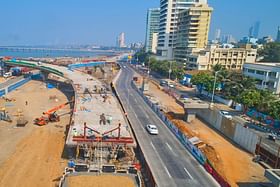These plants will be built between Mahalaxmi and Nepean Sea Road in the reclaimed areas where the Mumbai Coastal Road Project (MCRP) is being built.
The STPs aim to prevent disposal of biological human waste in the reclaimed land, near which various slum pockets are located.
The Brihanmumbai Municipal Corporation (BMC) is making plans to construct four Sewage Treatment Plants (STP) in South Mumbai.
The estimated cost of this project is Rs 4 crore. These plants will be built between Mahalaxmi and Nepean Sea Road in the reclaimed areas where the Mumbai Coastal Road Project (MCRP) is being built.
An STP is a facility that purifies sewage water by removing contaminants, treating it to be suitable for release into water bodies.
The treated discharge helps to prevent the spread of toxicity and pollution, which can have a harmful impact on water quality, river ecosystems and surrounding habitations and regions.
According to an Indian Express report, the largest of the four STPs will be situated at Markandeshwar Nulla near Atria Mall. This plant will have a wastewater treatment capacity of 300 kilolitres per day (KLD).
Another STP, with a capacity to treat 100 KLD of sewage, will be erected at Darya Nagar near Mahalaxmi Temple.
There will also be a 50-KLD STP located near Jindal Bungalow at Nepean Sea Road and a 35 KLD STP built near the Darya Sagar slums.
These STPs will be apart from the civic body’s mega seven STP projects, as per IE report.
The projects were initiated by Prime Minister Narendra Modi on 19 January of this year.
Mantayya Swami, chief engineer of the MCRP, said that these STPs are part of the MCRP and are being built to prevent disposal of biological human waste in the reclaimed land near which various slum pockets are located.
“Earlier, human waste from these slums would go into the sea, however, after the reclamation has been done for the MCRP project, the waste would get deposited on the surface itself. To prevent this, we are building these STPs at four such locations,” stated Swami.
He mentioned that while septic tanks were initially set up, the permanent and more sustainable solution entails the construction of these new STPs.
The funding for the STPs is being secured through the implementation of corporate social responsibility initiatives, while the technical guidance for building the plants is being provided by the Indian Institute of Technology IIT-Bombay.
Larsen and Toubro (L&T) is the appointed consultant carrying out the civil engineering works.
The construction of the STPs is being carried out in accordance with the NOC provisions specified by the Union Ministry of Environment for the project’s development.
The officials emphasised that the recycled water generated from the STPs will be utilised for landscaping purposes, which will commence shortly after the high-speed corridor becomes accessible for vehicles, in addition to other civic applications.


